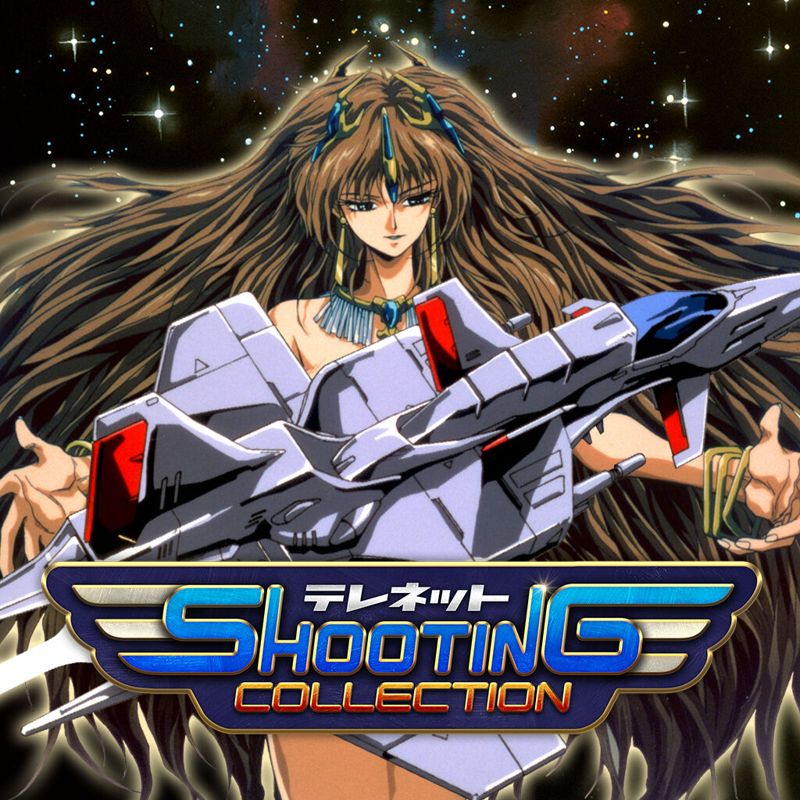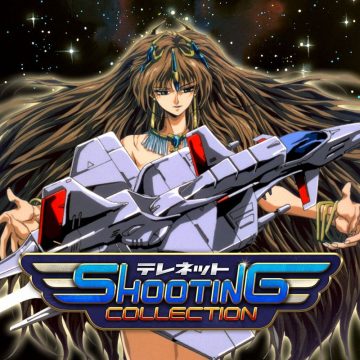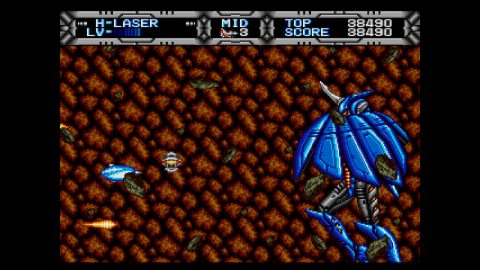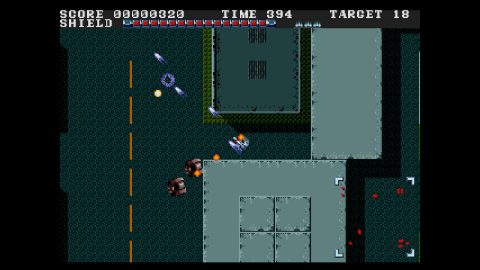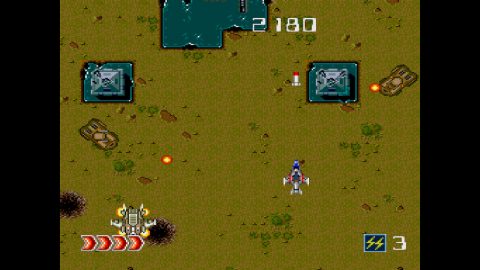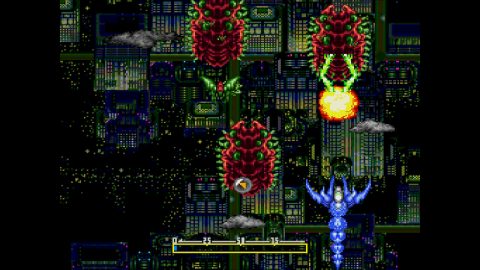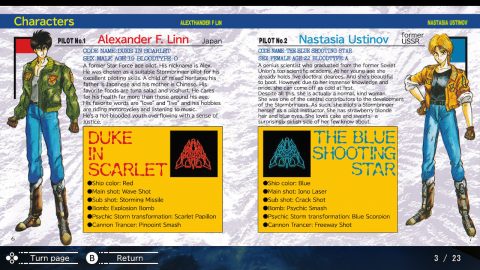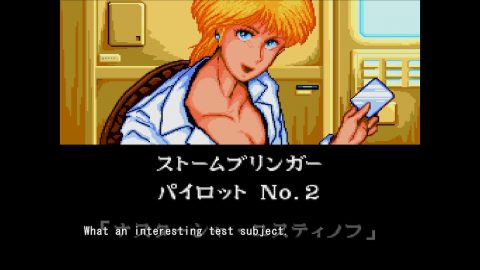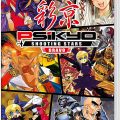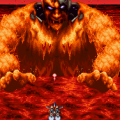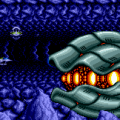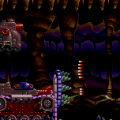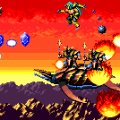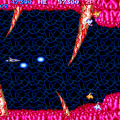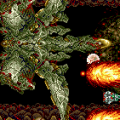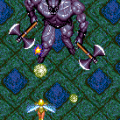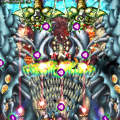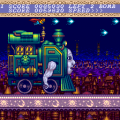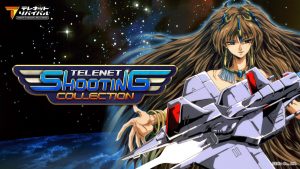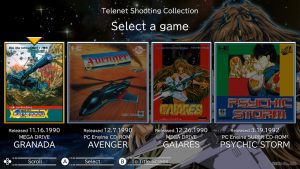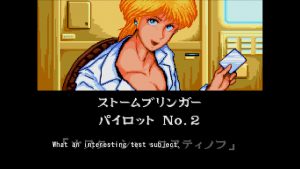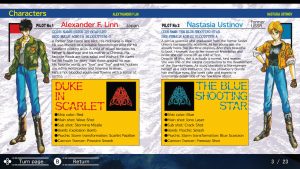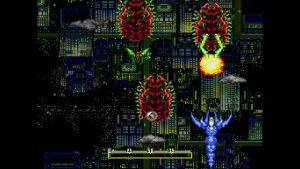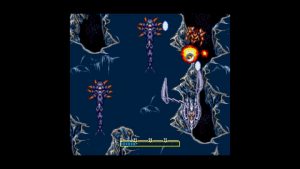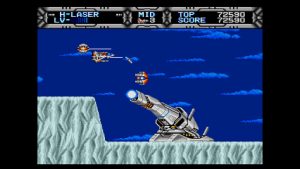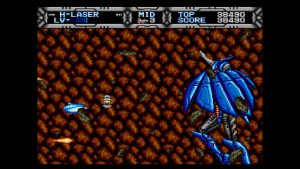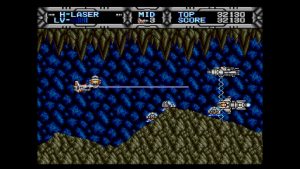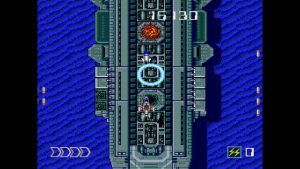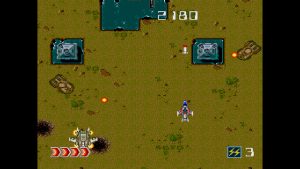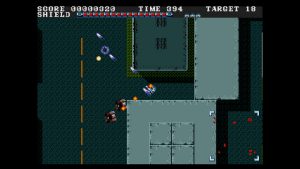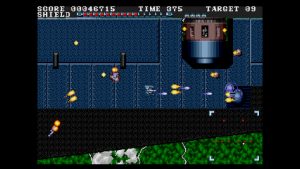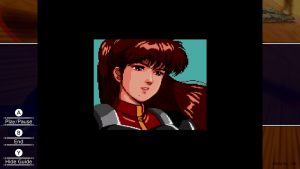Telenet was a prolific game developer in the late 1980s and early 1990s, beginning with computers and quickly transitioning into console development. Their focus was often on quantity over quality, with their games often featuring stellar cutscene artwork and excellent music, but typically lacking when it came to the actual game. Their most well-known work is the Valis series in its many incarnations, as well as action games like El Viento and RPGs like Cosmic Fantasy and Arcus. They also published a handful of shoot-em-ups, originally published for the Genesis/Mega Drive and PC Engine, four of which are collected here on the Telenet Shooting Collection. This collection was published by Edia, owner of Telenet’s IP, and crowdfunded on the Japanese site Makuake.
Probably Telenet’s most well known (and best) shooter, Gaiares has a unique weaponry system where you use a detachable pod to steal weapons from enemies. Beyond giving you a large arsenal, it also encourages to you to latch onto every enemy you see, in hopes of getting something new and interesting. It’s also incredibly difficult, with punishing checkpoints that send you back quite a bit. It looks great and has a decent soundtrack, and while it’s not as polished as other Genesis shooters like Lightening Force or MUSHA, it’s still one of the standouts of Sega’s 16-bit shooter library.
Granada isn’t what one would normally considered to be a shoot-em-up, as it’s more of a tank run-and-gun (or “roll-and-gun”, perhaps). In each stage, you must hunt for specific targets, and then fight a boss. It’s easy to control, as you can move and shoot in any direction, and can even lock the angle of your gun to move independently. It’s not as intense as other overhead action games like Smash TV, since you’ll spend plenty of time wandering around empty scenery, following dots on your radar, but it’s still satisfying. It runs at a choppy 30 FPS though and has plenty of visual glitches, though this is the case with the actual game and not a fault of the emulation. It also has a decent soundtrack by future Tri-Ace composer Motoi Sakuraba. Though this game was released on both the X68000 and Genesis, only the Genesis version is included.
Avenger
One of the first shoot-em-ups released for the PC Engine CD, this looks and feels incredibly basic for a 16-bit shoot-em-up. The gimmick here is that you pilot a helicopter rather than a typical airplane or spaceship, and you can angle your shots left and right when you move, similarly to earlier shooters like Gyrodine. But while even the ropiest Telenet games could get by on its visuals and/or music, there’s very little attractive about this game. For example, take the bombs – in Toaplan games, every explosion is accompanied by a fancy visual effect which shows off their power, but here the screen clearing attack is just a short screen flash. That all being said, despite being obviously slapped together, there’s nothing horribly flawed about the game itself, so it’s functional if you have a tolerance for its mediocrity.
Psychic Storm
This wasn’t actually developed by Telenet, but instead came from Alfa System, who also developed a handful of other PC Engine shooters like Sinistron and the Download games. This is an overhead shooter where you can control one of four different ships, each with its own weapons and super transformations. The enemies here are gigantic insects, and the designs of the powered up ships look pretty cool, and the music isn’t half bad either. It lacks the quick pacing of other PC Engine vertical shooters like Blazing Lazers or Super Star Soldier, so it sometimes feels like it drags, but it’s still pretty fun.
The emulation here is basic but mostly functional. It offers support for save states, plus lets you rewind the action for a few seconds at a time, which is pretty handy in the brutal games like Gaiares, where dying can send you back a few minutes. Display options are limited to pixel perfect, 4:3, and ugly stretched widescreen, with no ability to add scanlines. The sound emulation in the Genesis games could use some work, with the gun sound effects for Gaiares sounding particularly sharp. There’s no way to remap buttons, and the developers neglected to mapt the Select button to anything, meaning there’s no way to access the debug menu cheat code for Psychic Storm.
Both the North American and Japanese versions of Gaiares are included, while Granada doesn’t have any text so the same game was released internationally. Avenger and Psychic Storm never left Japan originally, so they’re still in Japanese, but the sparse cutscenes and mission briefings have English subtitles. Also included are full manuals for all games, both the original Japanese and newly translated English versions. For each game, you can listen to the soundtracks and watch all of the cutscenes, plus there are also preview trailers, digitized from old video tapes. This supplementary is nice, though with any of these collections, some production material or developer commentary would’ve been welcome. The X68000 port of Granada isn’t drastically different from the Genesis version, but it did include some cool cutscenes, and it would’ve been nice to at least have the video footage here if they didn’t want to emulate that version. Also note that on the box cover image, the ship has been adjusted slightly so you see less of the naked body of the woman, probably to comply with rating bureau concerns. The scanned manual in the in-game museum is unaltered.
Some games are noticeable in their absence. The biggest one is Sol Feace/Deace, which seems like it should’ve been a big deal considering it was included as a launch title for the Sega CD. Renovation, the American division of Telenet, also published a few other Genesis shooters, but these came from different companies in Japan – Arrow Flash originally was published by Sega, and Elemental Master was by Technosoft. Still, any of these games would’ve felt like a better inclusion than Avenger.
The overall package is mixed due to its game selection, where you get one great game (Gaiares), two decent ones (Granada and Psychic Storm), and one borderline stinker (Avenger). You can buy them individually too, but at $15 USD, they’re also double the price of a typical Arcade Archives titles, and despite the translated manuals, there’s not really enough extra work here to justify the high price.
